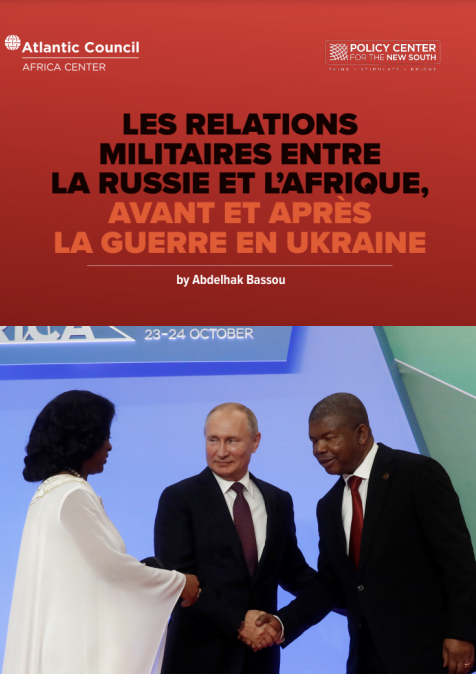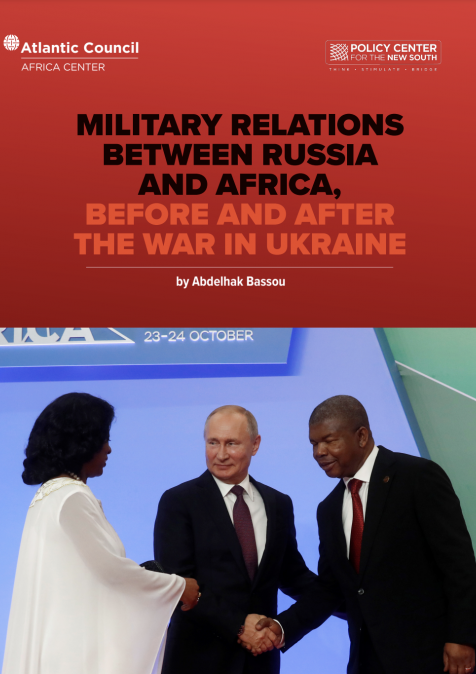Publications /
Opinion
Two days ago, Boris Johnson was appointed as the new prime minister of the United Kingdom after Theresa May stood down over her failure to lead Britain out of the European Union.
Below is an international press review of events leading to this British political change of scenery by Helmut Sorge, former Foreign editor, and Middle East expert for Germany's leading newsmagazine "Der Spiegel", and columnist at the Policy Center for the New South.
Ellen Barry, international correspondent for the « New York Times », based in London, qualified the man as “one of the great escape artists of British politics . He has walked away from gaffes, deceptions and errors that would have ended the career of any normal politician, brushing criticism away with his trademark bluster and self-confidence”. The most recent crisis occurred on June 21st, provoking headlines and debates about his ability to lead the nation. Boris Johnson, 55 at that day was still trying to win the leadership contest of his Conservative Party, which would lead, almost automatically, to be asked by the queen to form a government - the 14th Prime minister of her reign.
The queen did interrupt her vacation and Buckingham Palace waited to another historical change of political power. The members of the Johnson party just completed their vote, and the police did not need to question the politician again—an altercation had been reported by neighbors, Mr. Johnson apparently fighting with his girlfriend Carrie Symonds, 31, a former communication chief of the Conservative Party. Screams had been heard and recorded on a cell phone, the noise of breaking glass and Ms. Symonds shouting “get off me” and then “get out of my flat”. Mr. Johnson’s loose cannon behavior was criticized by politicians and commentators, but his hard-core supporters, noted Ellen Barry “seemed to like him even more.”
Johnson refused to explain the incident and did not apologize. “Part of his appeal is that he upsets the grown-ups, and a lot of voters like that, said Andrew Gimson, author of “Boris: The Rise of Boris Johnson”. There is a similar dynamic to Trump, observed the biographer, “the more he upsets the pious liberals, the better pleased his supporters are”-politics now and then descending into the theater of the absurd. The first global politician to send congratulations when Johnson won the leadership contest- Donald Trump. The US president twitted: “He will be great”. Make Britain great again, yes, for sure. Brexit will liberate the United Kingdom from the shackles, as Winston Churchill, his great hero, liberated Europe occupied by Nazism.
“A RATHER WEIRD SENSE OF POWER”
When the Prime minister stepped out of his silver colored “Jaguar” at Downing Street and walked towards the door lettered 10, his new residence, for a few days or months, his girlfriend, dressed in a pink dress waited among secretaries, aides, bodyguards, for his rumbling speech to the nation, including clear words towards Europe, which he now not only has to confront, but convince: Britain’s Prime minister has 99 days to find a compromise or crash out of the European Union. Promise. Yes, a Johnson- promise. He has the reputation to escape into lies, just as his soul brother in Washington, who in his almost three years in office has used about 10 000 documented lies, so-called “alternative truths”. Fake news, that’s the others, the enemy of the people, the Press, to whom Boris Johnson, until his appointment, belonged, as a commentator for the right wing “Daily Telegraph”- to him the daily is what “Fox” TV to Trump. A tool to influence the loyal base. Propaganda pure. The US President receives free service from “Fox”, Johnson was paid 275 000 pounds a year by the “Telegraph”.
The full name of the new leader is Alexander Boris de Pfeffel Johnson. Despite his middle England surname, he is not one of those landowner, horseracing and Foxhunting descendants, with whom he shared life in Eton and later at Oxford University. His great grandfather was a Turkish politician, Ali Kemal, who was lynched by pro Attaturk nationalists. His grandfather, Osman Ali, changed his name to Wilfred Johnson and raised his four children to be emphatically English and upper class. The father of Boris, Stanley Johnson, served as European Commission official in Brussels, and oversaw Pan European legislation on the environment. Daddy was a “remainer”, until his son Boris stepped in. The father now is arguing for departure and warned of underestimating the determination of his boy “You have to take him very seriously, very much so. He is serious.” The parents divorced, one of his brothers is a Conservative member of parliament, and voted, as his sister, to remain in the European Union. Brussels is where Britain’s new Prime minister has worked as a correspondent for the conservative “Daily Telegraph”, already then critical of the European project.
The talented journalist, who had been fired by the “Times” because he had faked a quote, began producing front page scoops, that mirrored the euro sceptic opinion of the Telegraph readers : sniffer dogs would be dispatched to regulate the smell of manure. The European Union would ban prawn flavored potato chips. A former Foreign Affairs press secretary during those years, remembers Mr. Johnson’s reporting as “not well-founded on facts. It was exaggerated, it was dishonest, and it massaged information to fit a narrative that he had preconceived.” Johnson’s distortion, enriched with humor, bordering on satirical writing, made him a brand. “Everything I wrote was having this amazing, explosive effect on the Tory Party, and it really gave me this, I suppose, rather weird sense of power.”
“ONE OF THE MOST POPULAR POLITICIANS IN THE COUNTRY”
In 2001, he was elected to Parliament, was fired from a job at the conservative party for lying to cover up an extramarital affair. To advance his career in the capital, Johnson styled himself as a centrist, winning two elections as mayor of the left leaning London. Nothing burnished Mr. Johnson’s brand like the Olympics in 2012. He reveled in the chance, noted the “New York Times”, to sell Londoners on to their city, and to sell himself to the world. Boris Johnson, in those days, was “one of the most popular politicians in the country.” No more. He is a divisive figure, and as Ellen Barry researched, has accumulated a long list of embittered former mentors and allies. “Max Hastings, who hired young Boris at the” Telegraph” insists he “would not take Boris word about whether it is Monday or Tuesday.” Glen Newey, one of his early professors, warned that his “low boredom threshold, penchant for fantasy and disdain for detail would augur ill for Johnson’s tenure.”
Mr. Johnson’s appeal to his base “rests heavily on his enthusiastic comments about a “no deal Brexit”, which for William Davies, a sociologist and political economist at “Goldsmiths, University of London, and author of “Nervous States: Democracy and the decline of Reason”, is nothing less but a “kamikaze policy that would devastate Britain’s economy and produce a state of emergency for basic civil infrastructure, such as the supply of medicines. “More disturbingly, notes Mr. Davies (New York Times, 25.6.19), new polling figure suggest that Conservative Party members are now so “fixated on Brexit that they believe it is worth doing at almost any cost-even if it leads to Northern Ireland or Scotland leaving the United Kingdom, significant damage to the UK economy, or most strikingly, the destruction of the Conservative Party.” An alternative is ready-the Brexit Party, which in reality has only one member, the founder and leader Nigel Farage, “the British crisis in human form” as Richard Seymour, an editor at Salvage magazine stated, author of the forthcoming book “The Twittering Machine”. For the writer Farage is “one of the most effective and dangerous demagogues Britain has ever seen. Mr. Farage has done more than any politician in a generation to yank British politics to the hard, nationalistic right. “His party won nearly a third of the British vote in the recent European elections. Thanks to Farage’s success the Conservative Party and the new prime minister are under enormous pressure to deliver Brexit in October. His government ministers are almost all hardened Brexiteers. Yet, Europe will hardly re-open the negotiations of the Brexit deal. It is more likely, if doubtful, that the new power in London will ask for another extension of the deadline? Would he dare? Boris Johnson most likely will travel to the capitals of those whom he considers open to new negotiations. He will attempt to split the Europeans, divide and conquer.
THE RETURN TO GRANDEUR, OR MAKE BRITAIN SMALL AGAIN?
Boris Johnson feels the shadow of mega populist Mr. Farage, like himself a close ally of Donald Trump. His rival’s movement offers only one real policy: a no deal Brexit, enriched by some dose of racism and anti-immigration rhetoric. The great escape. The return to grandeur, or make Britain small again? Mark Rutte, the Dutch prime minister, warned in an interview with the Spanish Newspaper El Pais that outside the European Union the UK would be “a middling economy stuck in the Atlantic Ocean.” Boris Johnson starts where Mrs. May, now in early retirement (but determined to continue in politics as member of parliament) left off— just in a fragile political state, or really facing the greatest peacetime crisis since 1945. A nation divided, a complex and intractable crisis, beyond Brexit. Britain, mainly England, in search of itself, caught in nostalgia and frustration. Johnson’s majority in parliament is two, a bi election in Wales in a matter of days may cost another seat. Any vote of confidence may signal a possible fall of the government and general elections are likely and the savior to some, the lightning rod for others, may turn into the shortest serving PM since in 1827, when George Canning moved out of Downing Street after hardly four months in office.
Current polls suggest a fluctuating four way split between the Brexit Party, the Conservatives, Labor and the Liberal Democrats. The political situation is “inclement, the room for maneuver limited, the stakes high, “writes James Butler, co-founder of Novara Media, who does not rule out that Boris Johnson “could bring about the end of Britain itself.” Brexit is mainly driven by English passion. Scotland and Northern Ireland voted to remain in the EU. And Scotland’s first minister, Nicola Sturgeon, calls for a second independence referendum, an independent Scotland,” judges Butler, “may be conjured out of the chicanery of Mr. Johnson’s rule”. The Scottish leader is on record that the new British prime minister lacks” competence and integrity”, and the idea that he leads the UK is “a horrifying prospect.”
Johnson, for two years’ foreign secretary in Theresa May’s government, will certainly have noted a comment about Britain’s earlier negotiation tactics by Donald Tusk, then President of the European Council: “I’ve been wondering what that special place in hell looks like for those who promoted Brexit without even a sketch of a plan how to carry it out safely”. Given Johnson’s role in the Brexit campaign his reception among European colleagues was chilly and his language proved anything but diplomatic. Johnson, an admirer of Winston Churchill, compared, one example, the former French President Francois Holland, to an officer in a world war II prisoner of war camp. Even the conservative “Economist” has doubts about the populist darling of the Brexit class:” Mr. Johnson’ s incompetence is balanced by his perceived electability. His leading role in Brexit has made him less popular and more divisive. But he is still the conservatives most recognizable figure and best campaigner. “His most recent high profile job, foreign secretary, found him “ill at ease in a role that required more gravitas than grandiloquence”. (New York Times).Boris Johnson resigned from the May government in July 2018 claiming that Britain was “truly headed for the status of colony.” He returned to write his column for the “Daily Telegraph”.
For “Foreign Policy” (online), Johnson is more performance artist than politician. People support him for the same reason they picked “Boaty McBoatface” as a name for a British vessel because they thought it was funny-just like Boris, the charmer, twice divorced, at least one child as a result of an extra martial affair, always ready to provoke: in 2005, while campaigning to become conservative MP for Henley in general elections, the Oxford University graduate told voters, that choosing “Tory will cause your wife to have bigger breasts.” He compared Muslim women wearing hijabs to “letter boxes”, describing African children as “pickaninnies” with a “watermelon smile”, joked about gay men as “tank topped bum boys”. For the controversial politician most of these statements are nothing else but satirical, while all others have been taken out of context by evil journalists—the school of Trump. Never deny, just lie. Promise the rainbow and Brexit will be done in 99 days.
The opinions expressed in this blog post are the views of the author.






